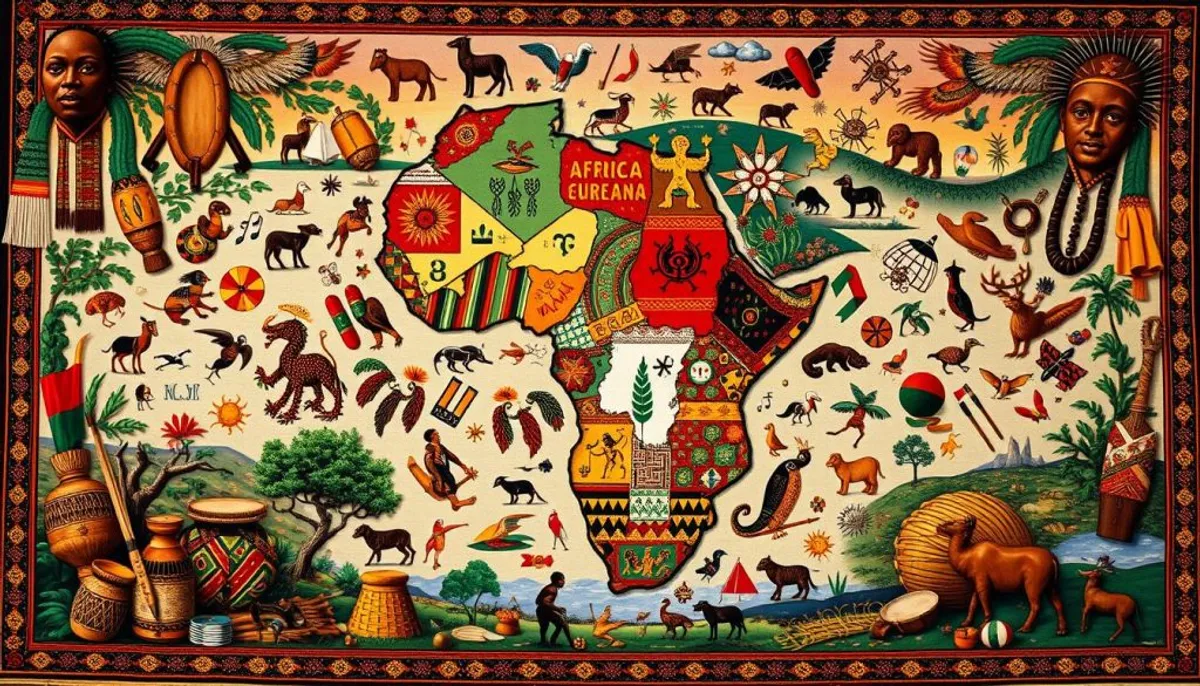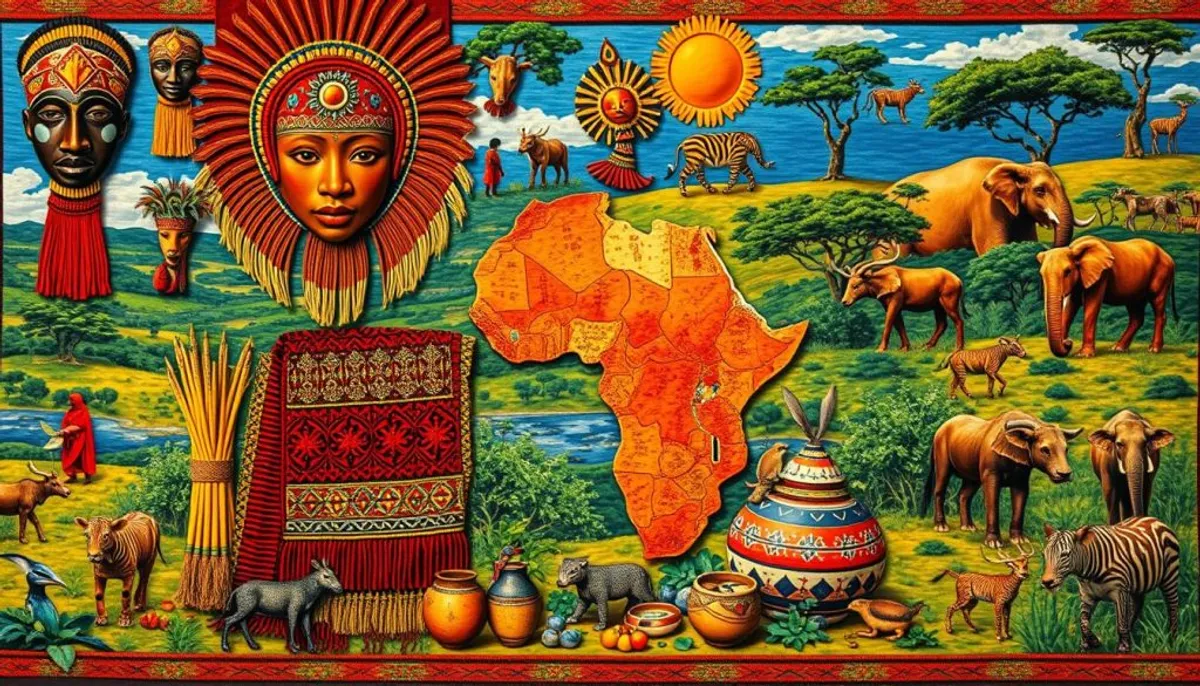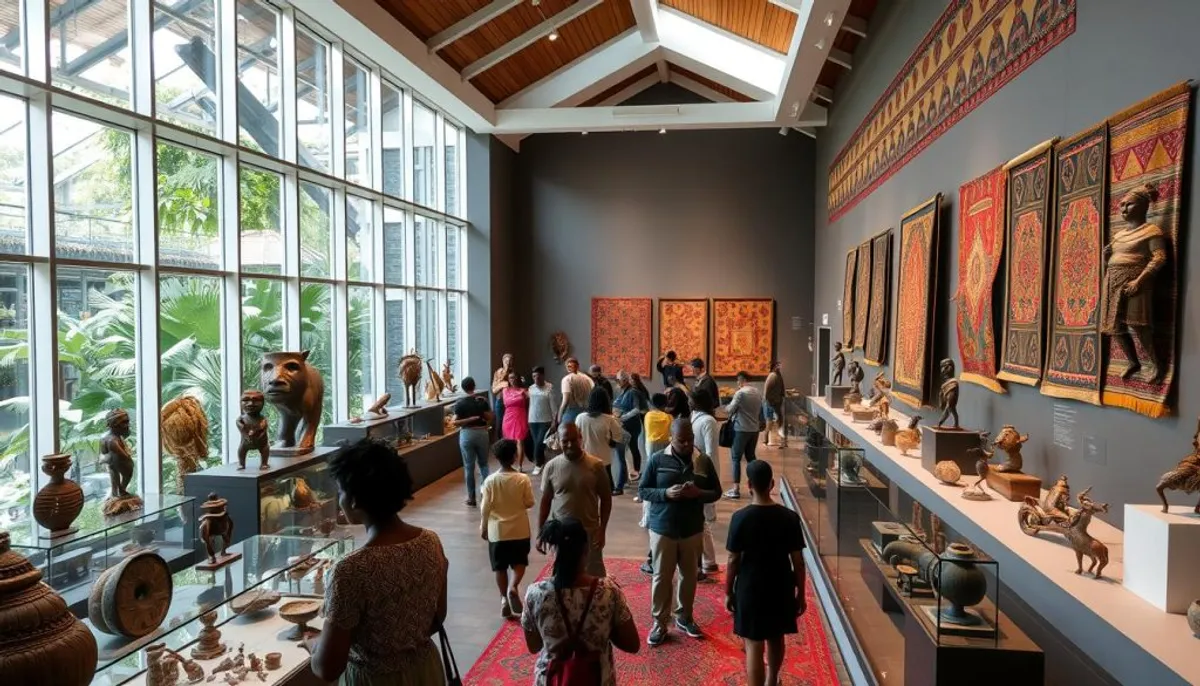Africa, the cradle of humanity, is rich in diverse heritage. It offers a unique cultural mosaic, ranging from African arts to ancestral traditions. The promotion of this cultural identity is paramount for many stakeholders.
The African Union, through its Agenda 2063, is committed to enhancing African culture. This project aims to strengthen the cultural identity of the continent. It also seeks to preserve its heritage and shared values. The establishment of a council dedicated to promoting culture within the AU illustrates this commitment.

The restitution of African cultural property is a subject of debate. French museums, such as the Quai Branly in Paris, hold approximately 88,000 objects of art from sub-Saharan Africa. These objects, including statuettes, masks, and jewelry, raise questions about their place and future.
Concrete initiatives are emerging. Benin has obtained the restitution of 28 objects belonging to the former kings of Abomey. Senegal has recovered a historic sword. These symbolic actions mark the beginning of a process of recognition and enhancement of African cultural identity.
The importance of the African cultural renaissance
The cultural renaissance of Africa is a fundamental pillar for the continent's progress. Cheikh Anta Diop initiated this idea as early as 1946, developing it in his 1960 work. Panafricanism, building on this idea, aims to unify African peoples.
The role of the African Union in cultural preservation
The African Union occupies a central place in the preservation of African culture. It values oral traditions, essential to African identity. The African Charter for cultural renaissance aims to promote these values.
Agenda 2063 and its cultural objectives
The African Union's Agenda 2063 includes ambitious cultural projects. The Great African Museum is one example. It aims to preserve and enhance the African heritage. UNESCO supports these efforts, helping 12 African countries to inscribe properties on the World Heritage list by 2030.
Cultural identity as a pillar of development
Cultural identity is crucial for Africa's development. The World Day for African Culture, on January 24, highlights its importance. It coincides with the adoption of the African cultural renaissance charter in 2006. This day provides a platform to promote the richness and diversity of African cultures on a global scale.
African cultural heritage and its restitution
The cultural heritage of Africa represents a precious treasure, but its presence in Western museums raises questions about restitution and conservation. This complex situation highlights the challenges related to preserving African heritage.
African collections in Western museums
Western museums house a significant portion of the cultural heritage of Africa. The Quai Branly Museum in Paris holds approximately 70,000 works of art from sub-Saharan Africa. These objects were acquired during the colonial period, between 1885 and 1960.

The process of restitution of works of art
The restitution of African heritage is a current topic. In 2020, the French National Assembly discussed a bill on the restitution of works to Senegal and Benin. Germany also plans to return bronzes from Benin to Nigeria. This process aims to rectify the wrongs of the colonial past.
The challenges of preserving heritage
The conservation of African cultural heritage presents major challenges. Experts emphasize the importance of rethinking the concept of a museum to adapt it to the African context. The preservation of objects, their exhibition, and their interpretation must be reconsidered to reflect African values and traditions.
| Country | Objects to be returned | Expected year |
|---|---|---|
| France | Artworks from Senegal and Benin | 2020-2022 |
| Germany | 1100 bronzes from Benin | From 2022 |
| Other Western countries | About 3000 to 5000 cultural properties | Under discussion |
How to promote African culture
Promoting African culture requires a variety of initiatives and events. These highlight the local heritage. Communities and institutions are essential in this valorization process.
Local and community initiatives
Local initiatives are crucial for preserving and promoting culture in Africa. The think tank WATHI has proposed five action paths to enhance cultural heritage in West Africa. Among these recommendations, raising awareness among populations through media and stimulating children's curiosity from a young age are paramount.
The role of cultural institutions
Museum institutions are at the heart of preserving and disseminating African heritage. The PCST program, funded by the Priority Solidarity Fund, has supported numerous cultural projects in ten African countries. Between 2004 and 2008, more than 561 projects were submitted, with an average grant of 9,000 euros per selected project. The conservation of heritage is essential to maintain the integrity and richness of these cultures.
The importance of cultural events
Cultural events play a major role in promoting African culture. Nearly 50% of the activities supported by the PCST have taken place within the framework of scientific festivals or thematic weeks. These events enhance cultural attractiveness and encourage exchanges among the region's populations.
| Type of activity | Percentage |
|---|---|
| Festivals and thematic weeks | 50% |
| Science clubs | 33% |
| Live performances | 15% |
| Other activities | 2% |
The development of African museums
African museums are experiencing remarkable growth, playing a crucial role in promoting and conserving the culture of the continent. The restitution of works of art by Western countries has given new momentum to this development. In 2021, France returned 26 royal treasures to Benin, marking a turning point in the recognition of African heritage.
The Museum of Kings and Amazons of Dahomey in Benin illustrates this cultural renaissance. It will showcase not only the returned works but also those of other rulers and heroes of Benin, providing a comprehensive view of the country's history. This initiative is part of a broader dynamic of heritage valorization, as evidenced by the inscription of the Abomey Museum on the UNESCO World Heritage List in 1985.

International cooperation plays a key role in the development of African museums. Exhibitions such as “Independence of Cameroon, liberating memory” organized by the Route des Chefferies, or the one presented at the Quai Branly Museum – Jacques Chirac in 2022, strengthen the ties between African and Western cultural institutions. This collaboration fosters the exchange of expertise and the circulation of works.
Local initiatives also contribute to the growth of African museums. In Cameroon, the Route des Chefferies has created a network of 14 museums in twenty years, demonstrating the importance of community projects in preserving heritage. These local museums play a vital role in educating and raising awareness among populations about their history and culture.
The development of African museums is accompanied by significant challenges in terms of conservation and professional training. Seminars such as the one on “The Organization of temporary exhibitions and the circulation of cultural goods in Africa” aim to strengthen the skills of cultural actors on the continent. These initiatives are crucial to ensure the sustainability and quality of exhibitions in African museums.
Creative arts as vectors of cultural promotion
African arts are crucial for promoting African culture. They cover a spectrum ranging from traditional music to contemporary art, including crafts. These creative expressions depict the richness and cultural diversity of Africa.
Traditional music and dance
Traditional music in Africa is central to many cultural events. In Benin, the Gaani festival attracts over 750,000 participants annually. This festival highlights ancestral rhythms and dances while posing challenges of organization and security.
Contemporary visual arts
African contemporary art is gaining increasing international recognition. Cotonou is positioning itself as a center of excellence for urban arts. In October 2023, it hosted a major conference on cultural promotion, as part of the 43rd General Assembly of the International Association of Francophone Mayors.
African crafts and design
Craftsmanship is a promising economic sector for Africa. The ACP-EU Culture program, endowed with 26 million euros, aims to encourage cultural entrepreneurship. It seeks to create jobs and increase the incomes of African artisans and designers.
Organizations like Art Moves Africa facilitate artistic exchanges on the continent. They provide funding for the mobility of artists, thereby contributing to the dissemination of African arts and Haitian crafts beyond national borders.
The valorization of African languages and traditions
Africa is rich in nearly 2,000 languages, according to UNESCO, an impressive linguistic heritage. This diversity is essential to the continent's cultural identity. However, African languages face major challenges in their promotion and use.
The preservation of local languages
African languages are crucial for preserving cultural identity. However, their official status remains limited. Less than 30% of the African population understands and uses European languages in political life. This situation excludes about 70% of citizens from public debate, highlighting the urgency of valuing local languages.
The transmission of ancestral knowledge
Oral traditions are central to the transmission of ancestral knowledge in Africa. In rural areas, 80% of residents actively participate in this transmission. Moreover, 70% of primary schools integrate traditional teachings into their curricula. These efforts contribute to the preservation of oral traditions and the cultural education of younger generations.
Valuing African languages and traditions requires a balanced approach. It is crucial to promote local languages while recognizing the importance of multilingualism. This approach will help preserve Africa's cultural richness while fostering its development and integration into the modern world.
RelatedRelated articles


